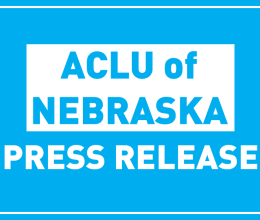Civilian Complaints in Nebraska
Table of Contents
Executive Summary | What the Experts Say | Method | Findings | Agencies Meeting Gold Standard | Recommendations
The ACLU and Police Accountability
The ACLU of Nebraska is a non-profit, non-partisan organization that works to defend and strengthen the individual rights and liberties guaranteed in the United States and Nebraska Constitutions through a sophisticated program of integrated advocacy with strategies that include litigation, negotiation, policy research, and public education. In 2016 we are proudly celebrating our 50th anniversary and are supported by over 2,000 members and about 6,000 supporters stretching far across our great state.
Police have the vital and difficult job of protecting public safety. Performing this job effectively does not require sacrificing civil liberties. The policies and actions of the police are instrumental in deciding who gets stopped, searched, arrested, and funneled into the criminal justice system; indeed, the United States' overincarceration crisis begins at the front end of the system. Meanwhile, often under the guise of our failed drug war, concerns over treatment of people of color are rampant, and federal grant programs enable the increasing militarization of local police departments.
In Nebraska, the ACLU has successfully worked to create mandatory training for law enforcement and has worked with specific departments on anti-bias trainings. As a government watchdog the ACLU periodically analyzes practices of individual law enforcement agencies such as their use of Tasers, civilian complaint procedures, and racial profiling practices to ensure our local agencies are meeting best practices in law and policy.
Executive Summary

The unique position of power and authority that members of law enforcement hold means that there is an added need to uphold high ethical standards and accountability to the community that a department is sworn to serve and protect. One officer who engages in misconduct or abuse of power can sully the reputation of the entire profession. It is imperative for executives to consistently maintain a culture of integrity and community trust throughout their departments every day.
U.S. Department of Justice[i]
Clear, accessible and welcoming complaint processes will build trust between the community and law enforcement and permit leadership to identify problems before they arise. With adoption of best practices, Nebraska law enforcement can ensure their good work is appreciated and understood by the public.
We are undergoing a nationwide conversation about policing right now. Law enforcement officers who risk their lives every day with valor and integrity as well as communities of color who worry about the safety of their children have a common goal: we must advance a positive dialogue to improve police-community relations.
This is why the ACLU of Nebraska chose to re-examine how accessible and transparent local law enforcement agencies are in the area of civilian complaints. In 2014, ACLU surveyed 31 of the largest police and sheriff departments in the state. We examined their websites and interactions with the public to determine how an average civilian might submit a concern or complaint to the Chief of Police or Sheriff. In 2014 our survey revealed that only 8 of the 31 agencies had any online information at all, and several departments could not answer basic questions related to civilian complaint procedures during a phone survey.
In 2016 the local landscape has dramatically improved. The good news for Nebraska is that more agencies have moved towards meeting the best practice recommendations of the US Department of Justice. There have been significant improvements by many Nebraska agencies that deserve high commendation.
Civilian complaints may be about relatively small infractions: perhaps a civilian has witnessed an officer driving poorly, using abusive language, or getting free perks at a local business. Some complaints may be more serious: perhaps it is a charge of racial profiling or using excessive force during an arrest. In either category, law enforcement leadership should pave an easy path to hear concerns by including clear information to the public.
Complaint procedures that are clearly spelled out and very accessible to the public send a positive message and promote police accountability. Both are vital to the maintenance of public trust in law enforcement.
In the following report, ACLU compared U.S. Department of Justice recommendations to current local practice. We have presented expert recommendations on best practices so those agencies who have not made improvements have a clear roadmap for moving forward.
What the Experts Say: Accountability through Policy
To encourage strong bonds of trust between law enforcement and the community, the U.S. Department of Justice recently unveiled a three-part series of guidance.[ii] The repeated message: make police more approachable, listen to the concerns of the community, open lines of communication, focus on relationships with communities of color. Civilian complaint processes are one of the simplest steps an agency can take to open up lines of communication between law enforcement and the public.
According to the International Association of Chiefs of Police (IACP), the unethical work of one officer can severely undermine the work of thousands of his or her ethical colleagues; community trust is "key to effective policing" and the assurance of a department's "honesty, integrity, legitimacy, and competence."[iii]
There are three primary guidelines for complaint processes to ensure the maintenance of public trust in law enforcement. These recommendations have been developed by the Department of Justice’s COPS and IACP. These experts have produced three primary guidelines for complaint processes to ensure the maintenance of public trust in law enforcement.[iv]
-
Welcoming: Law enforcement agencies should clearly announce their desire to hear from the public with any and all complaints.[v]
- Accessible: Departments should accept complaints in all forms, especially online forms.[vi] A web presence is particularly important in this digital age.
- Not intimidating: Complaint policies should not discourage potential complainants through threats of prosecution or deportation.[vii]
Requiring complaints to be made in person, limiting deadlines for filing a complaint, or limiting the process to business hours may discourage civilians with valid concerns from coming forward. Additionally, threats that false statements could lead to prosecution needlessly unnerve complainants, despite the fact that false complaints are rare.[viii] Law enforcement agencies should not actively discourage the filing of complaints.[ix] This creates the perception that police departments wish to cover up misconduct. Instead, law enforcement agencies should actively encourage civilians to file complaints if they believe misconduct has occurred in order to promote accountability and maintain community trust.
Method
For this report, in July 2016, the ACLU of Nebraska first conducted a review of websites for some of the largest law enforcement agencies in Nebraska to gauge the accessibility of police complaint processes.
We surveyed the following municipal police departments: Alliance Police, Ashland Police, Beatrice Police, Bellevue Police, Columbus Police, Falls City Police, Fremont Police, Grand Island Police, Kearney Police, Hastings Police, Lexington Police, Lincoln Police, Norfolk Police, North Platte Police, Omaha Police, Plattsmouth Police, Scottsbluff Police, Seward Police, Wayne Police.
We surveyed the following county sheriffs: Adams County Sheriff, Buffalo County Sheriff, Dodge County Sheriff, Douglas County Sheriff, Gage County Sheriff, Hall County Sheriff, Lancaster County Sheriff, Madison County Sheriff, Sarpy County Sheriff, Scotts Bluff County Sheriff, Seward County Sheriff.
Finally, we surveyed the Nebraska State Patrol, making a total of 31 agencies in the survey.
The ACLU of Nebraska evaluated whether the websites had clear information on the complaint process, whether there were multiple ways to submit a complaint, and whether there was any intimidating language that might discourage complaints.
Finally, ACLU volunteers called the selected agencies to ask “What is the complaint process for someone with a concern?” to determine how such a caller is treated. The goal of the website review and phone calls was to replicate what the average Nebraskan would experience if she wanted to report a concern.
Findings
Website Survey
Commendations belong to several agencies who improved their existing good website information from 2014 as well as to several agencies who created website information following our 2014 report.
In 2014, only 8 agencies had any information online at all. We are very pleased to report that number has increased to 14 so the following agencies have at least some information online to advise the public how to file a complaint or concern:
- Alliance Police
- Beatrice Police
- Bellevue Police
- Fremont Police
- Kearney Police
- Lincoln Police
- Omaha Police
- Scottsbluff Police
- Douglas County Sheriff
- Gage County Sheriff
- Hall County Sheriff
- Lancaster County Sheriff
- Sarpy County Sheriff
- Nebraska State Patrol
The results of this survey are heartening. Real progress is being made towards meeting best practices when a civilian has a concern or a complaint about law enforcement. The ACLU of Nebraska hopes that by recognizing this positive work by so many agencies in our great state that other agencies that have not had the time or opportunity to establish online information in this regard are inspired by these many examples from their peers about how they too can establish civilian complaint information online.
Notable Commendations for Agencies Meeting DOJ Gold Standard

OMAHA POLICE: Particular commendation goes to the Omaha Police Department. OPD formerly had an intimidating warning on their complaint form during the 2014 survey. The 2016 research revealed that this language had been removed and that OPD provides a clear outline of the process, makes materials available in Spanish, and utilizes accessible methods of complaints now fully meeting the DOJ gold standard for civilian complaints.
DOUGLAS COUNTY SHERIFF: Sheriff Timothy Dunning also deserves particular commendation for meeting the DOJ best practices. The Douglas County Sheriff’s website has actively encouraging language seeking to elicit concerns from the public, it clearly explains their complaint process, offers several methods to submit a complaint, and explicitly promises there will be no retaliation for a complaint. Further, since 2014, Sheriff Dunning has conducted training of all personnel to ensure civilians will be treated respectfully if they make a complaint.
Public trust with the community we serve is vital to the success of every law enforcement agency. An open and transparent complaint process is central to building and maintaining that trust, and it reinforces accountability within the agency. As an accredited agency, we proactively evaluate our policies and procedures and make changes that reflect national best practices. – Timothy Dunning, Douglas County Sheriff
ALLIANCE POLICE: Alliance Police Department earned praise in our 2014 report and they have become even more accessible and welcoming. There are multiple methods to submit a concern, the process is clearly explained to the public, there is an explicit promise that there will be no retaliation, and the department promises to “thoroughly investigate” complaints.
BEATRICE POLICE: Beatrice Police Department added complaint information to their website since 2014. They’ve adopted the DOJ best practices, as they accept anonymous complaints, permit people to submit concerns in several different ways, welcome third party complaints, and the site clearly describes the process that follows after a complaint.
BELLEVUE POLICE: Bellevue Police Department had good information available online in 2014 and continues to provide a link on the front page of their website that directs people to complaint information. Complaints are accepted in several ways.
LINCOLN POLICE: Lincoln Police Department earned the highest praise in our 2014 report, and they remain one of the most accessible and welcoming civilian complaint processes in the state. LPD deserves particular commendation for making their forms available in Arabic and Vietnamese as well.
HALL COUNTY SHERIFF: Hall County has added complaint information to their website since 2014, promises to address all concerns “with serious consideration,” and follows DOJ best practices by even permitting anonymous complaints.
SARPY COUNTY SHERIFF: In 2014, Sarpy County was meeting all aspects of the DOJ recommendations, including having Spanish language materials. They continue to provide multiple methods of complaint submission and a very clear and accessible explanation of the process to allay public concerns.
Say thanks to these law enforcement agencies
Concerns
Unfortunately, a few agencies have failed to improve poor practices we noted with concern in 2014 and a few agencies in fact moved towards being less accessible than they were several years ago.
Agencies only accepting compliments: Columbus Police[x] and Grand Island Police[xi] both have robust websites with a specific mechanism to submit compliments about police—but lack any information whatsoever about how to submit a concern or complaint. It is entirely appropriate that these and other agencies have a process in place to receive positive information about an individual officer’s good works in the community. However, we believe that civilian oversight and accountability is best met when similar processes are equally provided for civilian complaints.
Little or no information: Fremont Police[xii] and Kearney Police[xiii] both deserve commendation for adding some information since 2014, but both essentially only have a single sentence inviting the public to contact the department with a complaint. Neither explains the process.
Threats of prosecution: Gage County and Scottsbluff Police have complaint information on their website with substantial information about the process. However, Gage County has set an arbitrary 30 day time limit and contains the intimidating threat of prosecution. Civilians must sign a statement that says “Knowingly giving false information to a Law Enforcement Officer is a punishable offense under 28-9071(a).”[xiv] Scottsbluff Police warn “If you intentionally make a false report to this department, you should know that making a false report could result in criminal and/or civil legal proceedings being filed against you.”[xv] The DOJ specifically advises agencies to eliminate such threats—the average civilian might worry “If I complain about a he-said-she-said situation that I can’t prove, will that expose me to jail time?” Law enforcement leadership should have the ability to quickly dismiss unfounded complaints as appropriate without utilizing language identified as potentially problematic by the DOJ.
Inaccessible: It is disappointing to see the Nebraska State Patrol has moved away from DOJ best practices during the most recent survey of agencies. In 2014, NSP had a webpage that invited civilians to communicate in a variety of ways to ensure accessibility: it permitted complaints to be submitted in person, by phone, or mail and provided all necessary contact information to reach Patrol leadership. Unfortunately, NSP now only has an online form that inexplicably requires date of birth, no information about the complaint process, and no possibility for anonymous complaints.[xvi] People who do not wish to share their email or phone are barred from using the form, which requires all fields to be populated with information. In other words, the Patrol has moved away from DOJ recommendations and become significantly less accessible.
Ask these law enforcement agencies to improve complaint procedures
Telephone Survey
An ACLU volunteer phoned the same 31 agencies to ask a simple question: “What is the process for filing a complaint against an officer?” The volunteer was trained to not imply she had a complaint, and if asked, openly stated she had no complaint in order to ensure there was no misunderstanding.
The same barriers that might discourage someone reviewing police websites were repeated in the phone survey experience. One rural agency informed our volunteer “You have to pick up the form to file a complaint in person,” which would limit many people’s ability to follow up and possibly intimidate others.
The good news is that our volunteer generally reported that the 31 surveyed agencies were cordial and professional, even when they encountered employees who were not well versed in these issues. This contrasts with our 2014 survey, where our volunteer callers found some agencies refusing to provide any information on the phone.
Ongoing professional development and training within departments can ensure that every employee knows how to respond to a civilian complaint. Law enforcement leadership can follow the cue of the Douglas County Sheriff’s recent all-staff training to make sure concerns are addressed appropriately and directed to the right member of the organization for review.
Recommendations
All Nebraskans deserve to feel safe and protected by law enforcement, and accountability is an essential ingredient to maintaining the public trust. We suggest that every law enforcement agency in Nebraska adopt the following recommendations to improve their complaint processes.
- Add civilian complaint information to agency websites. Many agencies in Nebraska maintain a website but have no information about their complaint process on their websites. Law enforcement agencies should make information on complaint procedures and policies easy to find on their websites as well as through brochures available in public places.
- Allow complaints to be submitted in any form. Requiring complaints to be filed in person or via forms that require specific identifying information such as date of birth can quickly discourage potential complainants. Accepting complaints via email, mail, phone, or fax enables civilians to submit their complaints in the manner they find most appropriate.
- Accept complaints from anyone. Experts stress the importance of accepting anonymous and third-party complaints, as well as complaints from minors, in order to ensure that any incidents of potential misconduct are investigated. Additionally, law enforcement agencies should refrain from imposing arbitrary time limits on complaint submissions.
- Refrain from intimidating potential complainants. Complainants, who may already be wary of law enforcement, may be deterred by unnecessary threats of prosecution or immigration consequences. Fear of retaliation can influence civilians who may have valid concerns about police misconduct to not file their complaints.
- Provide training for all staff. Frontline staff responsible for law enforcement action in the streets as well as office staff should know how to take a civilian concern and direct it appropriately to reach leadership.
Conclusion
While much work remains to ensure full compliance with best practices statewide much progress has been made over the past two years. That is good news to inspire us all to action and to do better by each other during these difficult times.
Acknowledgements
Appreciation to Madison Wurtele and Kelli Yost, UNL student researchers, and Marin Krause, B.A., who all contributed to this project.
|
|
Has Information Online |
Multiple Ways to Submit Complaint |
Complaint Process Is Free of Threats |
Complaint Information in Multiple Languages |
|---|---|---|---|---|
|
Alliance Police |
Yes |
Yes |
Yes |
No |
|
Ashland Police |
No |
No |
No |
No |
|
Beatrice Police |
Yes |
Yes |
Yes |
No |
|
Bellevue Police |
Yes |
Yes |
Yes |
No |
|
Columbus Police |
No |
No |
No |
No |
|
Falls City Police |
No |
No |
No |
No |
|
Fremont Police |
Yes |
Yes |
Yes |
No |
|
Grand Island Police |
No |
No |
No |
No |
|
Hastings Police |
No |
No |
No |
No |
|
Kearney Police |
Yes |
Yes |
Yes |
No |
|
Lexington Police |
No |
No |
No |
No |
|
Lincoln Police |
Yes |
Yes |
Yes |
Yes |
|
Norfolk Police |
No |
No |
No |
No |
|
North Platte Police |
No |
No |
No |
No |
|
Omaha Police |
Yes |
Yes |
Yes |
Yes |
|
Plattsmouth Police |
No |
No |
No |
No |
|
Scottsbluff Police |
Yes |
Yes |
No |
No |
|
Seward Police |
No |
No |
No |
No |
|
Wayne Police |
No |
No |
No |
No |
|
Adams Co. Sheriff |
No |
No |
No |
No |
|
Buffalo Co. Sheriff |
No |
No |
No |
No |
|
Dodge Co. Sheriff |
No |
No |
No |
No |
|
Douglas Co. Sheriff |
Yes |
Yes |
Yes |
No |
|
Gage Co. Sheriff |
Yes |
Yes |
No |
No |
|
Hall Co. Sheriff |
Yes |
Yes |
Yes |
No |
|
Lancaster Co. Sheriff |
Yes |
Yes |
Yes |
No |
|
Madison Co. Sheriff |
No |
No |
No |
No |
|
Sarpy Co. Sheriff |
Yes |
Yes |
Yes |
Yes |
|
Scotts Bluff Co. Sheriff |
No |
No |
No |
No |
|
Seward Co. Sheriff |
No |
No |
No |
No |
|
NE State Patrol |
Yes |
No |
Yes |
No |
[i] Building trust, supra, at 37.
[ii] U.S. Department of Justice press release issued February 12, 2016: http://www.cops.usdoj.gov/Default.asp?Item=2843
[iii] U.S. Department of Justice, Office of Community Oriented Policing Service, Building trust between the police and the citizens they serve: An internal affairs promising practices guide for local law enforcement, page 3, (2010) available at http://www.theiacp.org/portals/0/pdfs/buildingtrust.pdf
[iv] Id.
[v] U.S. Department of Justice, Office of Community Oriented Policing Service, Standards and guidelines for internal affairs: Recommendations from a community of practice, page 14,(2009) available at http://ric-zai-inc.com/Publications/cops-p164-pub.pdf
[vi] Id. at 14-16.
[vii] Id.at 17.
[viii] Building trust, supra, at 86-87.
[ix] Id.
[x] Columbus Police Department: http://columbusne.us/index.aspx?NID=215
[xi] Grand Island Police Department: http://www.grand-island.com/your-government/police
[xii] Fremont Police Department: http://www.fremontne.gov/index.aspx?nid=17
[xiii] Kearney Police Department: http://www.cityofkearney.org/index.aspx?NID=1715
[xiv] Gage County Sheriff’s Office Citizen Compliment/Complaint Form: http://assets.colenient.com/images/articles/48/48-citizencomplimentcomplaintform.pdf
[xv] Scottsbluff Police Department: http://www.scottsbluff.org/departments/police_and_emergency_management/how_to_file_a_commendation_or_complaint.php
[xvi] Nebraska State Patrol: https://statepatrol.nebraska.gov/vnews/display.v/SEC/Contact%20Us%7CFile%20a%20Complaint
Related content

Law Enforcement Accountability
August 8, 2016
Know Your Rights with Law Enforcement
February 7, 2020
A School Police Officer Can Do More Harm Than Good
February 14, 2019ACLU Unveils Investigative Report on Nebraska’s School Police Programs
December 20, 2018
Thanks to you - 2017 Victory List
December 22, 2017
